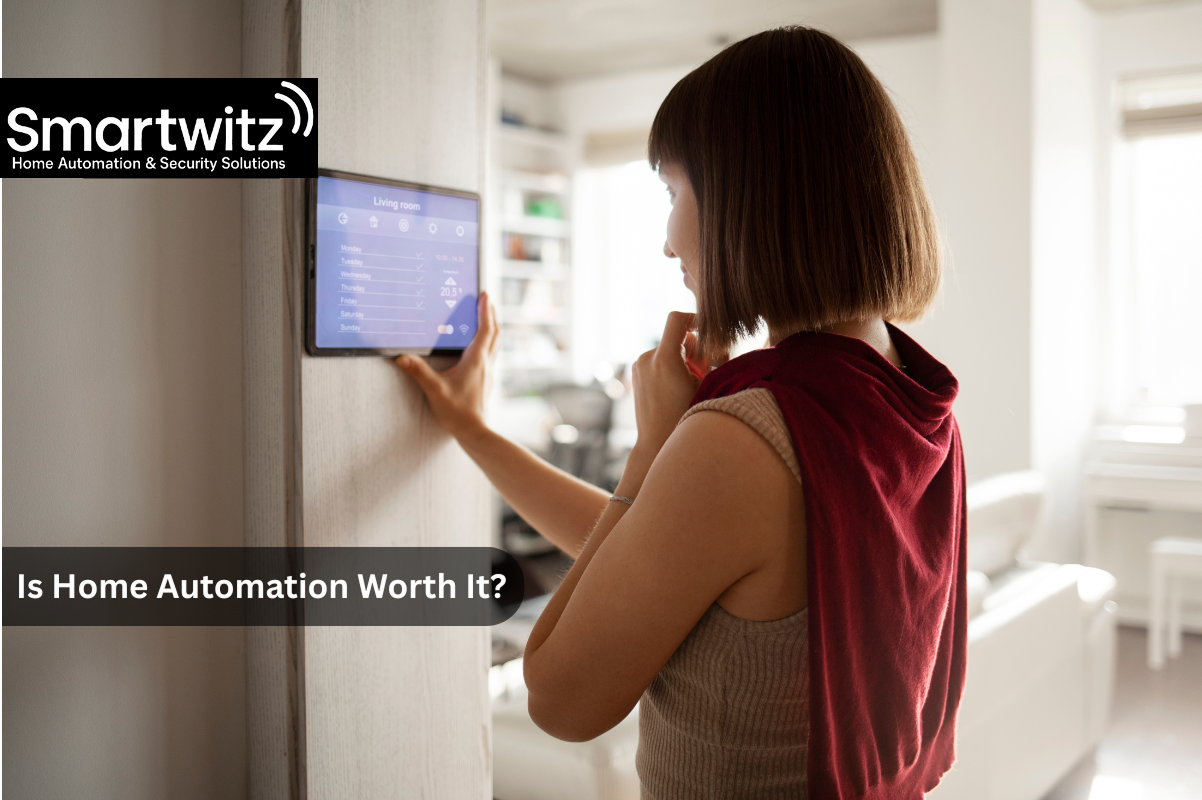Is Home Automation Worth It?

Home automation has emerged as a key breakthrough that is changing the way we interact with our houses in the rapidly changing world of modern living. However, the issue still stands: is home automation really worthwhile? We provide a thorough analysis of the actual worth, advantages, and possible profits of purchasing a smart house.
Comprehending Home Automation: A New Lifestyle
The term “home automation” describes how technology is incorporated into your living space to allow for centralised control of many home systems, including entertainment, security, heating, lighting, and more. Homeowners can control a variety of equipment remotely or automatically depending on preset conditions by using IoT (Internet of Things) devices, artificial intelligence, and smart applications.
The Principal Advantages of Home Automation
Unrivalled Comfort and Convenience
By enabling homeowners to handle several activities with a few smartphone taps or basic voice commands, home automation systems provide unmatched convenience. The convenience that home automation offers is the ability to control the thermostat, turn down the lights, lock the doors, and play your favourite music, all from the comfort of your couch.
Additionally, home cinema automation improves comfort by establishing surroundings that may be customised. Automated blinds open and close according to the temperature or time of day, smart lighting adjusts to natural light levels, and smart thermostats learn your preferences.
Improved Safety and Security
The main factor influencing the uptake of home automation is security. Surveillance cameras, motion detectors, smart locks, and video doorbells are examples of smart security systems that offer real-time monitoring and notifications. Potential intruders can be discouraged by automated devices that can mimic occupancy while you are away.
Additionally, smoke detectors, carbon monoxide alarms, and flood sensors instantly notify your devices to allow you to take quick action in case of an emergency, which is another way that home automation improves safety.

Notable Cost Reductions and Energy Efficiency
Smart houses maximise electricity use and minimise waste, which increases energy efficiency. Smart thermostats provide intelligent heating and cooling controls, while smart lighting makes sure that lights are switched off in vacant spaces. Smart irrigation systems save water and save utility costs by watering your landscape according to weather forecasts.
Since energy expenditures can be significantly reduced over time, home automation is not only a smart lifestyle choice but also a wise financial move.
An increase in the value of real estate
Putting money into Home Automation Company in Navi Mumbai might raise your property’s market value considerably. Smart features are becoming more and more important to today’s buyers when they are looking for new houses. You can increase your home’s appeal, futuristic feel, and competitiveness in the real estate market by integrating integrated systems.
Better Accessibility for Everyone Smart homes significantly improve accessibility for the elderly and disabled. All residents are guaranteed increased independence and a higher quality of life thanks to voice-activated technology, automated lighting, fall detection sensors, and remote health monitoring.
Nonetheless, there are other ways that the return on investment (ROI) appears:
Insurance carriers frequently provide discounts for an iterable amount of the initial investment that is recovered when property resale values noticeably increase.
Therefore, even if the initial expenses could be high, the long-term financial and lifestyle advantages make the investment worthwhile.
The Most Important Features for Home Automation:
Intelligent Lighting
Smart switches and lights provide scheduling choices, colour changes, and brightness adjustments, which enhance ambience and save energy.
Climate Control Using Intelligence
In order to ensure maximum comfort and energy economy, smart thermostats such as Nest and Ecobee automatically change the temperature based on your behaviour.
All-inclusive Security Options
Smart security solutions, such as SimpliSafe security kits and Ring video doorbells, are crucial parts of a secure automated home.
Entertainment Systems That Are Automated
Smart TVs, streaming hubs, and whole-home audio systems put entertainment at your fingertips and allow for seamless device integration.
Smart assistants and voice control
With the help of voice control features like Apple HomeKit, Google Assistant, and Amazon Alexa, interacting with your smart home is simple.
Possible Negative Effects of Home Automation
Despite the obvious benefits, it’s vital to recognise certain possible drawbacks:
Initial Costs: Depending on the size and brand selection, the setup may be costly.
Complexity: Managing several devices from various brands can become difficult without adequate integration.
Privacy Issues: There is a chance of cyber threats and breaches as gadgets gather data.
Maintenance and Updates: To operate at their best, smart home appliances need to be updated and occasionally maintained, just like any other technology.
However, these worries can be greatly reduced with expert advice and strong cybersecurity safeguards.
Are You a Good Fit for Home Automation?
The choice ultimately comes down to your priorities, needs, and way of life. Home automation is definitely a good investment if you value convenience, security, energy efficiency, and higher property value. Smart solutions are necessary for modern life, and home automation provides just that—a safer, smarter, and more effective way to live.